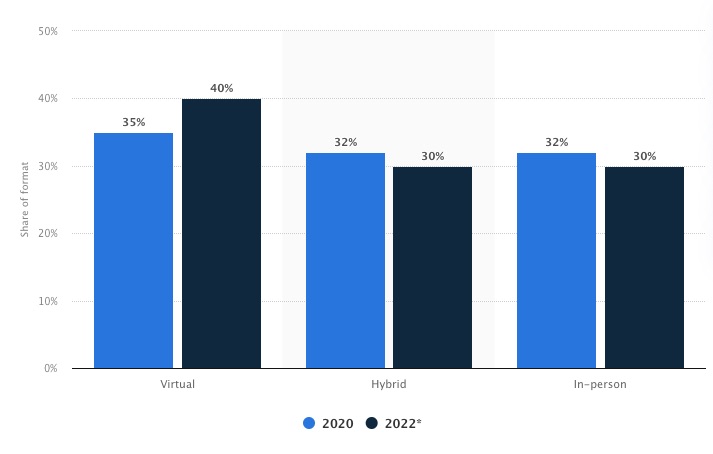How often have you walked around a conference with a tote bag you received at check-in filled with event agendas, maps, name tags, and other information you need to navigate the conference? Well, those days may be a thing of the past as savvy event planners turn to mobile event apps to create better, more immersive experiences for attendees.
[box] According to research, 91% of event organizers say that adopting a conference app resulted in positive event ROI. And it’s no surprise — a mobile app custom-designed for your event lets attendees engage with your event content, each other, and your sponsors before, during, and after the event. And what were once “nice-to-have” features have become “must-haves” in an event landscape completely transformed by COVID-19. According to Statista, 40% of events in 2022 will be virtual, but hybrid events — events held in-person and online — are becoming the norm. Event organizers are wise to bring technology to bear on the challenges facing them in 2022. [/box]

Five must-have features for event apps
-
- Ticketing and registration: Organizations with existing apps can leverage their existing audiences — and provide them with early access — to event registration, and collect payment all in one place.
- Push notifications and updates: Don’t let social media algorithms or SPAM filters interfere with your communication strategy. Whether you’re marketing an event to existing subscribers or informing event attendees about new speakers, experiences, or changes to the agenda, take your message directly to your members with a mobile app.
- Q&A and polling: Apps allow organizers and speakers to interact with individual attendees easily. When a keynote speaker asks the audience a question, instead of asking for a show of hands, they can ask for in-app responses — and even show real-time results on stage. Virtual attendees can submit their questions and organizers can pass those on to speakers.
- Networking: Content may be king, but at events, networking opportunities run a close second. Apps not only enable users to see who else will be attending but can also let them communicate before the event to set up meetings.
- Post-event surveys: Instead of handing out paper surveys at the event and hoping attendees fill them out — or sending a link to a survey via email — use your app to take the survey straight to attendees while it’s still fresh in their minds.
While these features are fairly standard for event apps, the sky’s the limit. From streaming live content to hosting videos after the event is over, organizers can use custom mobile apps to enhance the attendee experience and streamline processes. See how three very different organizations are using apps to enhance the in-person experience for event attendees.
Mobile apps for events: three use cases
House of Fine Arts (HOFA)
House of Fine Arts uses its app to provide additional context about the art on display at events like Art Palm Beach 2022 and collect post-event surveys to gather data on what attendees loved and what they can improve upon.
athLEDA
athLEDA’s app allows the organization to connect student-athletes with mentors who will help them transition to life off the field. While the virtual nature of the app allows athLEDA to connect students and mentors regardless of their locations through virtual chat sessions, the team also organizes physical events to bring everyone together. The app is integral to keeping attendees informed and connected, even on-site.
Cross County Center Mall
Malls are a popular gathering place for shoppers — and event-goers. At the Cross County Center Mall in New York, events are a popular way to bring people together, and an app helps organizers spread the word. From Rotary Club car shows to Pride Month shopping guides, the Cross County Center Mall app helps people find and navigate events of all kinds.
To learn more about how organizations are using custom mobile apps to build better on- and off-line experiences, visit our resources page to explore our case studies.



